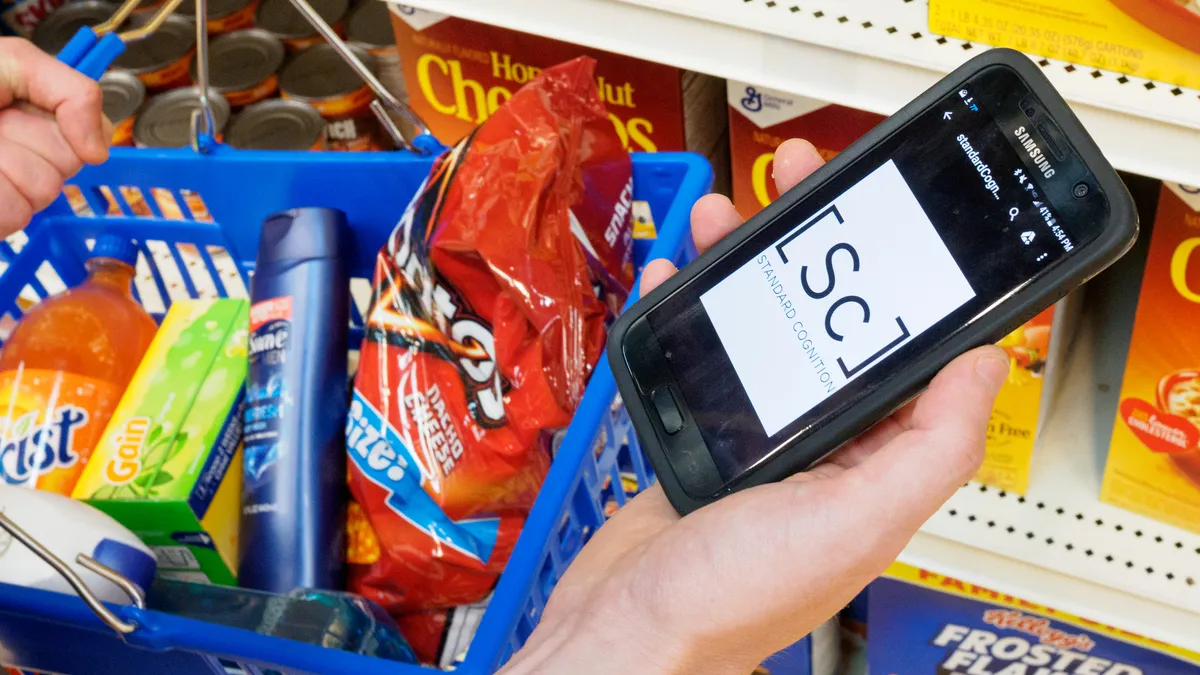Dive Brief:
- Standard Cognition, a developer of AI-powered autonomous checkout solutions for brick-and-mortar retailers, announced yesterday in a company press release that it has raised $40 million in Series A funding. The round, which brings Standard Cognition’s total funding to more than $50 million, was led by Initialized Capital.
- Standard Cognition's platform is available to any retailer and makes it possible for consumers to shop and pay without scanning or stopping to check out. An alternative to Amazon Go, the company will use the new funding to expand its team and accelerate global expansion plans. The startup has recently opened a cashierless pilot store in San Francisco and secured four retail customers in North America, Asia and Europe.
- "In 2019, consumers will start to see autonomous checkout deployed in their favorite stores, and by 2025, it will be common. We're seeing in our San Francisco store that shoppers love the convenience, and retailers love the accuracy, cost savings and customer service advantages. We can't wait to execute on this next stage of Standard's growth," said Jordan Fisher, co-founder and CEO of Standard Cognition, in a press release.
Dive Insight:
Standard Cognition is among a handful of startups poised to challenge Amazon Go's cashierless technology, and Amazon should not only be aware of the competition but vigilant about its rapid growth plans. While a number of other startups have entered the autonomous scan-and-go space, Standard Cognition is one of the only companies launching a physical store and rapidly acquiring customers to rival Amazon Go, according to Fast Company.
This round of funding was significant for Standard Cognition, more than tripling what it had raised to date. The company is just a year old, and with the new funding, it plans to add 70 to 80 more employees to its existing team of about 40. This should help the company obtain retail clients more quickly — not only in the U.S. but around the globe.
The major difference between Amazon Go technology and Standard Cognition's is that the latter platform is available to any retailer around the globe, whereas Amazon Go technology is, of course, proprietary to Amazon. The retail giant has big plans for Amazon Go stores, with its eye on opening 3,000 stores in the next three years, but it will need to identify and build out store locations.
Standard Cognition, on the other hand, can identify existing retail operators that want to use its technology and easily expand without having to go through the physical building process. Its first client in Japan already has plans to deploy Standard Cognition's platform in 3,000 stores. Still, while the company has found early success, it is also facing serious competition from Zippin, a similar AI platform that has also opened a cashierless store in San Francisco.
While the technology is expensive, Standard Cognition requires significantly less hardware than Amazon Go. Where Amazon Go uses hundreds of cameras, Standard Cognition's platform needs just 27 overhead cameras, which use shape and movement as opposed to facial recognition. Its seemingly simple setup — just overhead cameras and a computer to operate — will likely appeal to retailers who don't want to undergo any major transformations, and customers will appreciate that they can utilize the platform without a special app.
Amazon Go has been the most buzzed about pioneer in the cashierless technology space, but it struggled early on in rolling out its technology. As companies like Standard Cognition demonstrate their capabilities and the technology becomes more widespread, Amazon Go will begin losing its edge over the competition. It will be interesting to see how quickly and widely autonomous checkout technology catches on with retailers. Ahold Delhaize has already reported testing scan-and-go technology in the Netherlands, and odds are that this is just one of the first big name grocers to make the move as the technology becomes more cost-effective and easier for retailers to implement.













